Trade rocks already unstable U.S., China relations
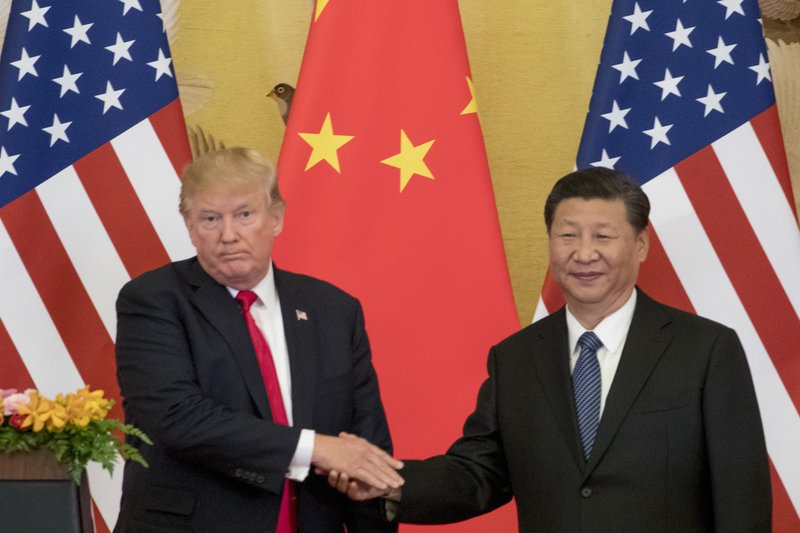
President Donald Trump’s trade battle with China will exacerbate relations with Beijing that are already fraying on several fronts as the U.S. takes a more confrontational stance and an increasingly powerful China stands its ground. The gloves came off Friday as the world’s two largest economies imposed tariffs on billions of dollars of each other’s goods amid a spiraling dispute over technology. It comes at a time when Washington needs China’s help in ending its nuclear standoff with North Korea. Trump’s much-vaunted personal rapport with Chinese President Xi Jinping, whom he hosted at his Mar-a-Lago resort three months after taking office, won’t help patch up differences, experts and former officials say. “The notion that there’s a personal relationship which will somehow supersede China’s strategic interests and the well-being of the Communist Party — including its ability to manage its own economy consistent with its political interests — is absurd,” said Daniel Russel, top U.S. diplomat for East Asia under President Barack Obama. “There’s no scenario in which an affectionate relationship, real or imagined, is going to stay Xi’s hand,” Russel said. Troubles in the bilateral relationship go beyond trade. China has chafed about the scope of U.S. relations with Taiwan; U.S. complaints about its construction of military outposts on islands in the South China Sea; tougher screening of Chinese investment in the U.S.; visa restrictions; and accusations that it’s the main source of opioids. If not new, these are now deepening sources of tension between Washington and Beijing. Even as Trump has sought to cultivate his relationship with the increasingly dominant Chinese leader, his administration has chosen to confront an increasingly defiant China on pretty much all them. It also identified China, along with Russia, as a threat in the most recent U.S. National Security Strategy. In response, Beijing is hanging tough. “China has made it abundantly clear that it will never surrender to blackmail or coercion,” Chinese state news agency Xinhua said Friday. To what extent the trade tensions bleed into other aspects of the U.S.-China relationship, which has retained a mostly upward trajectory since the normalization of ties four decades ago, remains to be seen. But Mike Pillsbury, director of the Center for Chinese Strategy at the Hudson Institute, said U.S.-China relations are headed into “uncharted waters.” Recently returned from a visit to China, Pillsbury said he was told by government officials and businessmen that they were confused about what the Trump administration wanted them to do to get the U.S. to ease the trade tensions. They threatened to back off assisting the U.S. nuclear talks with North Korea. “They explicitly said that,” according to Pillsbury, who has written three books on China and has advised the Trump administration. “They said we will help you (the U.S.) less with North Korea if you start a trade war with us on July 6. Pretty clear, huh?” China has, in fact, already distanced itself somewhat from its significant cooperation with the U.S. on North Korea. After supporting tough U.N. sanctions and scaling back trade with the North after it ramped up nuclear and missile tests last year, Beijing has eased restrictions on its neighbor. That shift began after Trump in March abruptly decided to hold a summit with Kim Jong Un. Once again, China has again focused on rekindling its traditional alliance with Pyongyang — Xi has met Kim three times this year. Abraham Denmark, a former senior U.S. defense official on Asia, said China has welcomed Trump’s sudden shift from confrontation to diplomacy with North Korea and also his decision to halt large-scale military exercises with close U.S. ally South Korea. Yet China also views what happens with North Korea through the lens of the geopolitical rivalry between the U.S. and China, he said. North Korea long served as a buffer against America’s expanding its reach in Northeast Asia to China’s border. “If the U.S. is going to engage in a trade war, which is very troubling for China, politically, it’s going to reduce their willingness to cooperate on North Korea,” he said. Denmark, who is now director of the Asia program at the Wilson Center think tank, warned of a broader deterioration in relations, as Trump pursues more aggressive policies toward Beijing, and China stakes out a position as world player unwilling to be pushed around. “China under Xi Jinping has been more aggressive in its pursuit of its interests. I expect we’re going to see more tensions across the board: in trade, the South China Sea, Taiwan, Korea,” Denmark said. “These are all part of the same story, which is that China is feeling more confident and powerful, and more willing to accept friction and tension in the pursuit of its interests.” On recent trip to China, Defense Secretary Jim Mattis did some damage mitigation, talking up the importance of military cooperation despite his earlier decision to withdraw an invite for China to participate in a U.S.-led multinational naval exercise over its activities in the disputed South China Sea. Xi struck a similar note, calling military ties a “model component of our overall bilateral relations.” That may help to ward off the possibilities of unintended conflict between the two militaries, but it will not prevent a growing rift on other issues. The United States accuses China of using predatory tactics in a push to supplant American technological dominance. The tactics include forcing U.S. companies to hand over technology in exchange for access to the Chinese market, as well as outright cyber-theft. Trump’s tariffs are meant to pressure Beijing to reform its trade policies. On Friday, the Trump administration imposed tariffs on $34 billion worth of Chinese products. Within hours, China retaliated with taxes on an equal amount of U.S. products, including soybeans, pork and electric cars. Russel said that ultimately the Trump administration’s issuing of demands of China on trade and other issues could harden attitudes inside the country, weakening the hands of reformers and strengthening nationalists who vilify the United States. “The net effect of
Donald Trump’s tariffs threaten 567,500 jobs, $3.6B in Alabama exports says U.S. Chamber
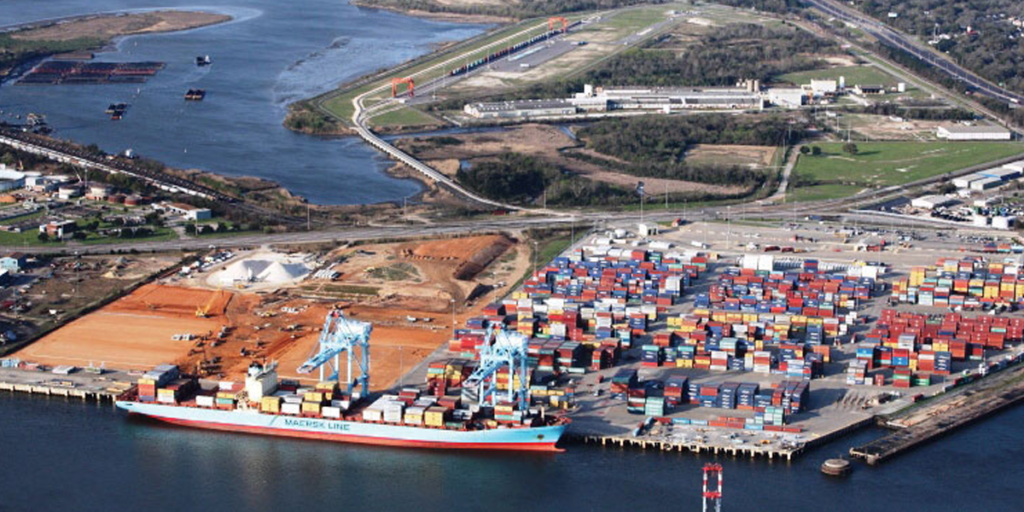
In a campaign opposing President Donald Trump‘s trade tariffs, the U.S. Chamber of Commerce on Monday released a report revealing more than $3.6 billion in Alabama exports are threatened by the President’s new tariffs. The Trump administration has targeted China, Canada, Mexico and European Union nations with large tariffs on imports, such as a 10 percent charge on imported aluminum and a 25 percent charge on steel, arguing their necessity to protect national security and to promote more domestic production. But the Chamber says the tariffs threaten to spark a global trade war as Canada, Mexico, the EU, and China have already retaliated or announced plans to retaliate with billions of dollars in tariffs on American-made products. “Tariffs imposed by the United States are nothing more than a tax increase on American consumers and businesses, including manufacturers, farmers, and technology companies, who will all pay more for commonly used products and materials,” the Chamber said in the report. “Retaliatory tariffs imposed by other countries on U.S. exports will make American-made goods more expensive, resulting in lost sales and ultimately lost jobs here at home. This is the wrong approach, and it threatens to derail our nation’s recent economic resurgence.” The tariffs could also trigger job losses. The Chamber said 567,500 Alabama jobs are supported by global trade. Alabamians against tariffs Last week, Gov. Kay Ivey contacted U.S. Secretary of Commerce Wilbur Ross and several members of the Alabama congressional delegation expressing her concerns over the tariffs. “Import tariffs, and any retaliatory tariffs on American made goods, will harm Alabama, the companies that have invested billions of dollars in our state, and the thousands of households which are dependent upon those companies for a good-paying job,” Ivey said in a statement. “I strongly oppose any efforts that may harm those companies that employ thousands of Alabamians and contribute billions to our economy. I am committed to protecting Alabama jobs and consumers, the world over, who are proud to purchase products made in Alabama.” U.S. Sen. Doug Jones is also concerned with the tariffs. “Auto manufacturers and suppliers employ nearly 200,000 of our constituents and that number is growing. These are good jobs employing American workers. Over the past several years the automotive industry, including foreign manufacturers, has invested billions in our states and created thousands of jobs,” wrote Jones, along with Tennessee U.S. Sen. Lamar Alexander.
Kay Ivey says Alabama could lose up to 4,000 jobs due to tariffs
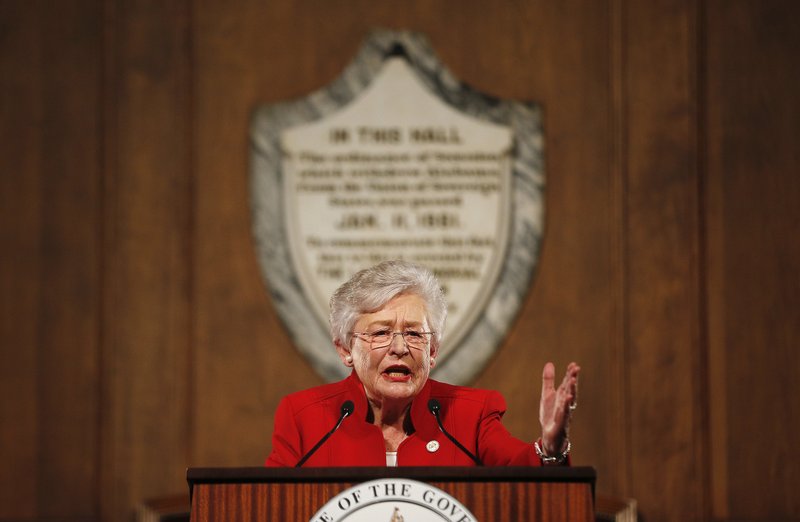
Last week, Alabama governor Kay Ivey released a statement saying the Trump Administration’s new tariffs will cause harm to the Yellowhammer State’s economy. Taking it a step further, she contacted U.S. Secretary of Commerce Wilbur Ross and several members of the Alabama congressional delegation expressing her concerns. “Import tariffs, and any retaliatory tariffs on American made goods, will harm Alabama, the companies that have invested billions of dollars in our state, and the thousands of households which are dependent upon those companies for a good-paying job,” Ivey said in a statement. “I strongly oppose any efforts that may harm those companies that employ thousands of Alabamians and contribute billions to our economy. I am committed to protecting Alabama jobs and consumers, the world over, who are proud to purchase products made in Alabama.” In her letter to Ross, Ivey touted Alabama’s record year in 2017 citing the nearly $3 billion in automotive-related investments, the announcement of a new Mazda-Toyota plant, and the more than 57,000 Alabamians who are already employed by the sates manufacturing sector. “In 2017, Alabama produced almost one million cars and light trucks and 1.7 million engines. However, Alabama’s success relies on access to foreign markets and imports of certain automotive components that become part of the vehicles produced in our state,” Ivey’s letter read. “Last year, Alabama reached a record high of $21.7 billion in exports. Our top export category was automotive, accounting for $10.9 billion of those exports. The largest importers of Alabama made goods and services were Canada, China, Germany, Mexico and Japan – all countries which may be forced to reciprocate in response to any new import tariffs.” Ivey ended her letter to Ross by saying that tariffs places on imported materials used for car manufacturing, and tariffs placed on the state’s exported vehicles would increase costs and cause a high number of Alabamians to lose their jobs. “Estimates show that a ten percent decrease in Alabama-made vehicle exports could result in the loss of approximately 4,000 jobs in Alabama,” the letter continued. “Such a loss would be devastating to thousands of families across our state. These are Alabama families who are dependent on the income from working in these facilities.” “As Governor of the Great State of Alabama, I strongly oppose any efforts that may harm those companies that employ thousands of Alabamians and contribute billions to our economy. I respectfully ask that you not recommend to President Trump the levying of trade tariffs on automobiles and automotive parts.”
In tit-for-tat, Donald Trump threatens more tariffs against China
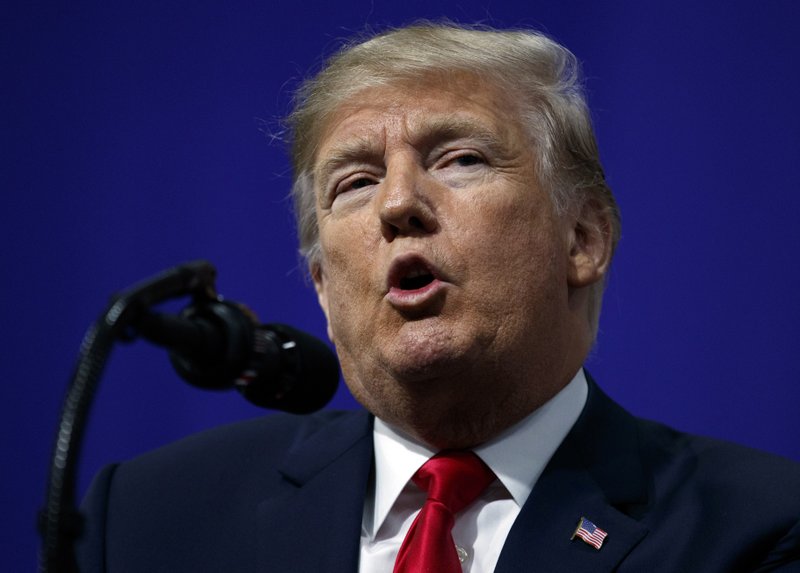
President Donald Trump has directed the U.S. Trade Representative to prepare new tariffs on $200 billion in Chinese imports as the two nations move closer to a potential trade war. The tariffs, which Trump wants set at a 10 percent rate, would be the latest round of punitive measures in an escalating dispute over the large trade imbalance between the two countries. Trump recently ordered tariffs on $50 billion in Chinese goods in retaliation for intellectual property theft. The tariffs were quickly matched by China on U.S. exports, a move that drew the president’s ire. “China apparently has no intention of changing its unfair practices related to the acquisition of American intellectual property and technology,” Trump said in a statement Monday announcing the new action. “Rather than altering those practices, it is now threatening United States companies, workers, and farmers who have done nothing wrong.” Trump added: “These tariffs will go into effect if China refuses to change its practices, and also if it insists on going forward with the new tariffs that it has recently announced.” China’s Commerce Ministry on Tuesday criticized the latest threat of tariffs, saying it was an “act of extreme pressure and blackmail that deviates from the consensus reached by both parties after many negotiations, and is a disappointment to the international community.” “If the U.S. becomes irrational and issues this list, China will have no choice but to adopt strong countermeasures of the same amount and quality,” the ministry statement said. Trump said that if China responds to this fresh round of tariffs, then he will move to counter “by pursuing additional tariffs on another $200 billion of goods.” It wasn’t immediately clear when the new tariffs could be put in place, as the trade office has yet to identify the Chinese goods to be penalized or conduct a legal review. The first round of penalties announced by both nations is set to take effect July 6. The intellectual property sanctions were the latest in a spate of protectionist measures unveiled by Trump in recent months that included tariffs on steel and aluminum imports to the U.S. and a tough rhetoric on trade negotiations from North America to Asia. The escalation in the dispute with China may also serve as a warning to other trading partners with whom Trump has been feuding, including Canada and the European Union. The move quickly drew praise from former Trump senior adviser Steve Bannon, who told The Associated Press: “President Trump told China and the world tonight that America will not back down when it comes to economic aggression.” But Wall Street has viewed the escalating trade tensions with wariness, fearful they could strangle the economic growth achieved during Trump’s watch. Gary Cohn, Trump’s former top economic adviser, said last week that a “tariff battle” could result in price inflation and consumer debt — “historic ingredients for an economic slowdown.” Trump’s comments came hours after the top U.S. diplomat accused China of engaging in “predatory economics 101” and an “unprecedented level of larceny” of intellectual property. Secretary of State Mike Pompeo made the remarks at the Detroit Economic Club as global markets reacted to trade tensions between the U.S. and China. He said China’s recent claims of “openness and globalization” are “a joke.” He added that China is a “predatory economic government” that is “long overdue in being tackled,” matters that include IP theft and Chinese steel and aluminum flooding the U.S. market. “Everyone knows … China is the main perpetrator,” he said. “It’s an unprecedented level of larceny.” “Just ask yourself: Would China have allowed America to do to it what China has done to America?” he said later. “This is predatory economics 101.” Asked to comment on Pompeo’s remarks, the Chinese foreign ministry in Beijing said in a regular briefing with reporters that the U.S. had lost credibility as a free trader. “We don’t want a trade war, but we’re not afraid of a trade war,” ministry spokesman Geng Shuang said. Pompeo raised the trade issue directly with China last week, when he met in Beijing with President Xi Jinping and others. “I reminded him that’s not fair competition,” Pompeo said. Trump had announced a 25 percent tariff on up to $50 billion in Chinese imports. China is retaliating by raising import duties on $34 billion worth of American goods, including soybeans, electric cars and whiskey. Trump also has slapped tariffs on steel and aluminum imports from Canada, Mexico and European allies. Pompeo on Monday described U.S. actions as “economic diplomacy,” which, when done right, strengthens national security and international alliances, he added. “We use American power, economic might and influence as a tool of economic policy,” he said. “We do our best to call out unfair economic behaviors as well.” In a statement, Trump says he has an “excellent relationship” with Xi, “but the United States will no longer be taken advantage of on trade by China and other countries in the world.” Republished with the permission of the Associated Press.
Kay Ivey sides with Doug Jones, says import tariffs could hurt Alabama industry
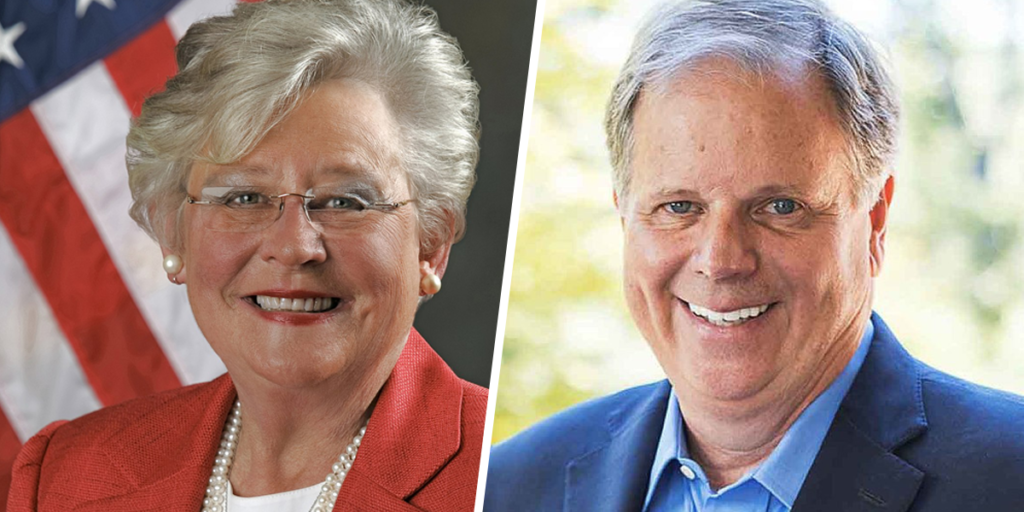
Alabama’s Republican governor is separating herself from President Donald Trump on the issue of trade, saying import tariffs like those supported by the administration would hurt the state. Gov. Kay Ivey released a statement Monday saying import tariffs could cause retaliatory tariffs that would drive up the cost of items made in Alabama and sold abroad. The administration already has imposed duties on $50 billion worth of Chinese imports, plus steel and aluminum from China, the European Union, Canada and Mexico. Ivey says growth in Alabama’s auto industry could be harmed if tariffs are imposed on U.S. goods around the world. Almost 60,000 people work in automotive-related jobs in the state. Both of Alabama’s U.S. senators, Republican Richard Shelby and Democrat Doug Jones, have previously said they oppose the tariffs. Republished with permission from the Associated Press.
Doug Jones says Donald Trump’s tariffs threaten Alabama’s auto industry
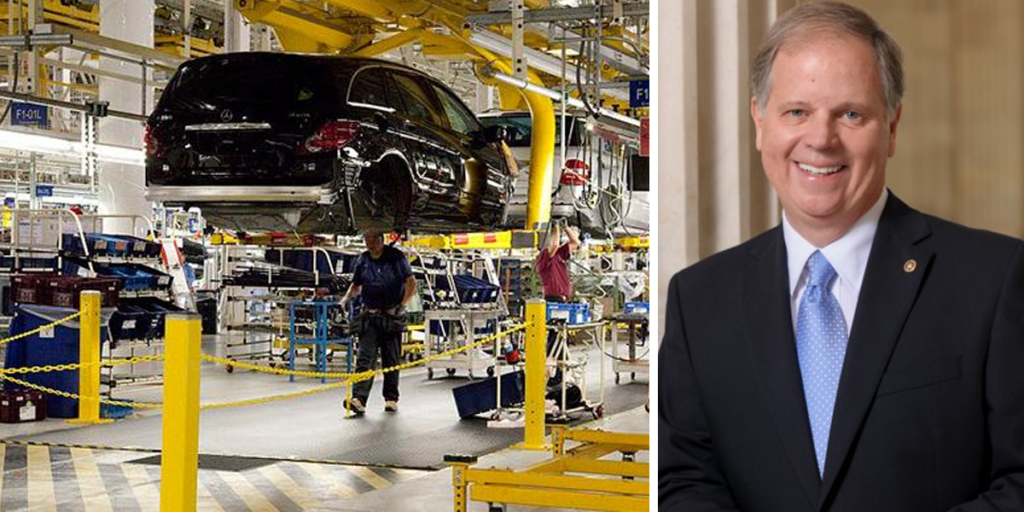
Alabama U.S. Sen. Doug Jones sent a letter to U.S. Department of Commerce Secretary Wilbur Ross on Thursday, criticizing President Donald Trump‘s proposed 25 percent tariffs on imported autos and auto parts into the United States. The letter argues that rather than helping the United States economy or improving national security, the tariffs will cost jobs and threaten the growth of the automotive manufacturing sector in the Southeast. “Auto manufacturers and suppliers employ nearly 200,000 of our constituents and that number is growing. These are good jobs employing American workers. Over the past several years the automotive industry, including foreign manufacturers, has invested billions in our states and created thousands of jobs,” wrote Jones, along with Tennessee U.S. Sen. Lamar Alexander. They continued, “We share with you and President Trump the goal of bolstering our nation’s security and making sure that our trade policy is balanced and works for American workers and businesses. We are worried though that tariffs on the automotive industry will serve neither of these purposes, and instead put hundreds of thousands of American jobs at risk including many in our home states.” Jones and Alexander urges Ross’ agency to reconsider the tariff. Trump’s auto tariff President Trump is working with his administration in hopes of revitalizing America’s industrial base and re-balancing America’s trade relationships. To that end, the Trump administration is mulling a plan to impose the tariffs by undergoing an investigation through Section 232 of the Trade Expansion Act. Section 232 allows Trump to impose trade restrictions that threaten U.S. national security, including levying tariffs on foreign goods that excessively displace domestic goods or cause loss of skills/investment or substantial unemployment. “Big news coming soon for our great American Autoworkers. After many decades of losing your jobs to other countries, you have waited long enough,” Trump tweeted last month before announcing the tariff There will be big news coming soon for our great American Autoworkers. After many decades of losing your jobs to other countries, you have waited long enough! — Donald J. Trump (@realDonaldTrump) May 23, 2018 Below is the complete text of the Jones/Alexander letter: The Honorable Wilbur Ross Secretary United States Department of Commerce 1401 Constitution Avenue N.W. Washington, D.C. 20230 Dear Secretary Ross: We are writing in response to the Commerce Department’s investigation under Section 232 of the Trade Expansion Act of 1962 into whether imports of automobiles, including SUVs, vans and light trucks, and automotive parts into the United States threaten our national security. We share with you and President Trump the goal of bolstering our nation’s security and making sure that our trade policy is balanced and works for American workers and businesses. We are worried though that tariffs on the automotive industry will serve neither of these purposes, and instead put hundreds of thousands of American jobs at risk including many in our home states. Auto manufacturers and suppliers employ nearly 200,000 of our constituents and that number is growing. These are good jobs employing American workers. Over the past several years the automotive industry, including foreign manufacturers, has invested billions in our states and created thousands of jobs. However, as a result of the Department’s investigation, automotive companies are currently facing the threat of direct and retaliatory tariffs, which could mean hundreds of millions of dollars of additional costs. To absorb these costs, automotive companies in our state could be forced to either raise prices or cut costs. Either scenario directly translates into lost jobs for our constituents. The Administration’s 232 investigation centers on the national security impact of the automotive industry in the United States. We can assure you that reducing the size of our state’s automotive manufacturing base will not bolster our nation’s security. In closing, we hope you will take into consideration the vital role the automotive industry plays in our states and the well-being of the tens of thousands of American workers who rely on this sector to make ends meet.
Immigration fight, tension on tariffs await Congress’ return
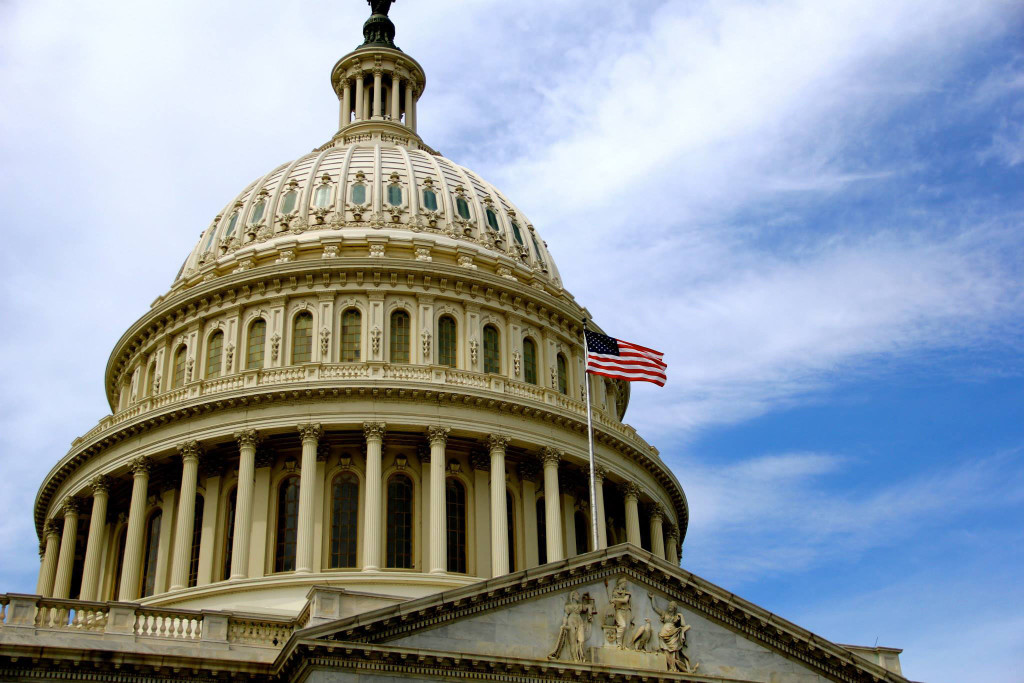
This was supposed to be the quiet time on Capitol Hill, but Congress returns to work Monday facing a showdown in the House over immigration while Senate Republicans are trying to stop an all-out trade war after President Donald Trump’s decision to impose import tariffs on close U.S. allies. Tensions are running particularly high as Senate Majority Leader Mitch McConnell is threatening to cancel the traditional August recess as he fights Democratic opposition to GOP priorities in a show of busy-work before the midterm election. It’s shaping up to be far from the typical summer slowdown when legislating usually makes way for campaigning. “Another summer, another heavy work load,” tweeted Sen. Chuck Grassley, R-Iowa, as he pushed to confirm nominations. “NOW is the time to vote on Fridays (even wknds!).” The Senate often is not in session on Fridays. Congress faces a few should-do items in the weeks ahead. Topping the agenda is passage of the annual defense bill, which includes pay raises for the troops. It has already cleared the House. The Senate could begin consideration of its defense bill this week. But the Senate version carries a warning to Trump with a trade provision to block any White House plan to lift penalties on the China-based telecommunications company ZTE, which faces trade law violations over selling sensitive technologies to U.S. adversaries. Trump’s moves on trade are expected to consume conversations among Senate Republicans this week. They’re worried about a wider trade war spiking prices for home-state businesses and consumers if Trump imposes steel and aluminum tariffs, as planned, on imports from Canada, Mexico and the European Union. Republicans will be making the case to the administration that the tariffs could dampen the economic gains from the GOP tax cuts and sour the mood among voters as lawmakers are campaigning to protect the Republican majority in Congress. Some Republicans are also hoping Trump simply changes his mind and doesn’t follow through with it. But aides said others may be signing on to a bill from Sen. Mike Lee, R-Utah, that would subject all trade actions by the executive branch, including tariffs, to congressional approval. Rep. Will Hurd, R-Texas, said he would support a similar move in the House. “Congress has shared our responsibility when it comes to trade with the executive branch over the last couple of decades, and I think that’s something that we need to re-evaluate,” he told CBS’ “Face the Nation.” Meanwhile, House Republicans face a self-imposed deadline Thursday for resolving an immigration standoff between GOP centrists who are forcing a vote on legislation to protect young immigrants who were brought to the country illegally as children and conservatives who want stricter immigration enforcement with money for Trump’s border wall. The centrists want to provide a way for the young immigrants to become permanent residents, which can lead to citizenship. Conservatives are opposed to creating a new pathway to staying in the U.S. permanently, equating it with granting amnesty to lawbreakers. Speaker Paul Ryan, R-Wis., and Majority Leader Kevin McCarthy, R-Calif., are trying to craft a Republican-led bill as a compromise between the factions, but it’s difficult. House leaders plan a two-hour private meeting of GOP lawmakers Thursday morning to hash out whether talks among the party’s factions have produced an immigration compromise that can win broad support. Underscoring the sensitivity of the session, staff is to be excluded. They’re trying to prevent the moderates from joining with Democrats to pass the “Dreamer” protections, which polls suggest are popular, but which would be a setback for GOP leaders and expose the majority to complaints from the conservative base. Without a deal, the moderates say they’ll push ahead with enough signatures on a so-called discharge petition to force the vote over the leadership’s objections. Hurd said moderates have the votes already, but are “engaged in conversations to figure out … is there another path. I don’t believe that there is.” Rep. Carlos Curbelo, R-Fla., said in an interview last week that he saw a 50-50 chance of those talks succeeding. He warned that if they didn’t bear fruit, he and his supporters “fully expect” to continue pushing their petition. Curbelo said the young immigrants must “be guaranteed a future in our country, meaning they cannot be exposed to deportation.” He said, “They must have permanent status immediately and they must have the option of a bridge into the legal immigration system,” meaning a pathway to citizenship. The moderates’ effort has won the backing of GOP Sen. John McCain, fighting brain cancer back home in Arizona, who tweeted on Saturday: “Congress can’t ignore this critical issue — and the many lives it impacts — any longer.” Starting Monday in the Senate, McConnell has teed up votes on three nominees to serve as federal district court judges, including the first Hispanic lawyer whom Trump nominated for the bench, Fernando Rodriguez Jr. of Texas. The selections are expected to receive bipartisan support, though more contentious votes are expected in coming weeks. Republicans have made it a top priority to get Trump’s nominees on the bench, to the alarm of Democrats, who say Republicans are working to stack the federal judiciary with young ideologues who will shape it for decades to come. Republished with the permission of the Associated Press.
Donald Trump renews China tariff threat, complicating talks

The Trump administration has renewed its threat to place 25 percent tariffs on $50 billion of Chinese goods in retaliation for what it says are China’s unfair trade practices. The White House also said Tuesday that it would place new restrictions on Chinese investment into the United States and limit U.S. exports of high-tech goods to China. The threats come just over a week after trade tensions between the world’s two largest economies had seemingly eased. Treasury Secretary Steven Mnuchin said May 20 that the trade conflict was “on hold.” Mnuchin’s comments followed a commitment by China to significantly increase its purchases of U.S. farm goods and energy products, such as natural gas. Commerce Department Secretary Wilbur Ross is scheduled to visit China on Saturday to negotiate the details of that agreement. Some trade experts said the tariff announcement is likely intended to strengthen Ross’s hand. Other analysts, however, say the newly confrontational stance may be intended to appease congressional critics of a deal the Trump administration made Friday that allowed Chinese telecom giant ZTE Corp. to stay in business. The tariff threat is unlikely to derail ongoing talks, they said. “This is really about Congress,” said Derek Scissors, a China specialist at the conservative American Enterprise Institute. “I don’t think it blows up a deal with the Chinese.” China’s Ministry of Commerce responded in a mild fashion Tuesday. The Ministry said the White House’s announcement “is contrary to the consensus the two sides have previously reached,” according to China’s official news agency, Xinhua. The statement did not reiterate China’s own previous threats to impose $50 billion in retaliatory tariffs on U.S. goods. Members of both parties in the House and Senate slammed the agreement the Trump administration reached with ZTE Friday, in which the Chinese firm agreed to remove its management team, hire American compliance officers, and pay a fine. The fine would be on top of a $1 billion penalty ZTE has already paid for selling high-tech equipment to North Korea and Iran in violation of U.S. sanctions. In return, the Commerce Department lifted a seven-year ban on ZTE’s purchase of U.S. components that it had just imposed earlier in May. China had complained strongly that the ban would put ZTE out of business, costing 70,000 jobs. Trump tweeted last month that the ban threatened too many Chinese jobs and he wanted to get the company “back in business, fast.” GOP and Democratic Senators attacked the deal as insufficient punishment for a company that defied U.S. sanctions policy. The White House said Tuesday that it will focus the tariffs on cutting-edge technologies, including those that China has said it wants to dominate as part of its “Made in China 2025” program. Under that program, China aims to take a leading role in areas such as artificial intelligence, robotics, and electric cars. The list of imports subject to the duties will be announced by June 15, the White House said, and the tariffs will be imposed “shortly thereafter.” The list will be based on a previous compilation of 1,300 goods released in April that will be narrowed based on public comments the administration has received. The list includes computer equipment, aerospace parts, medical devices, and industrial machinery. The tariff threat could still disrupt Ross’s China talks. “If Beijing was under the impression that Trump’s $50 billion of tariffs were actually on hold, they may find this confusing,” Chad Bown, senior fellow at the Peterson Institute for International Economics, said. “It could very well complicate Wilbur Ross’s visit.” Trump has bemoaned the massive U.S. trade deficit with China — $337 billion last year — as evidence that Beijing has been complicit in abusive trading practices. The White House, and many American companies, say that China forces U.S. firms to turn over technology as part of joint ventures with Chinese companies to gain access to its market. China also subsidizes many favored industries. Trump has frequently focused on the trade deficit, urging China to boost its imports and lower the gap by $200 billion, while China has refused to agree to any dollar amounts. Many experts and U.S. companies, however, warn that China’s efforts to protect its high-tech industries and capture U.S. technology represent the larger threat. The Trump administration said Tuesday that it plans to shorten the length of validity of some visas issued to Chinese citizens as part of a push to counter alleged theft of U.S. intellectual property by Beijing. The State Department said that under the new policy, U.S. consular officers may limit how long visas are valid, rather than the usual practice of issuing them for the maximum possible length. Scott Kennedy, a China expert at the Center for Strategic and International Studies, said that many foreign leaders are learning to not overreact to Trump’s threats, which are frequently seen as just part of negotiating strategy. That’s good for global stability, he added. “But that means the United States’ credibility is incredibly low,” he said. “I don’t think you can keep doing about-faces, and have everyone pretend the threat is as ominous as it was before.” Republished with the permission of the Associated Press.
Aimed at China, Donald Trump’s tariffs are hitting closer to home
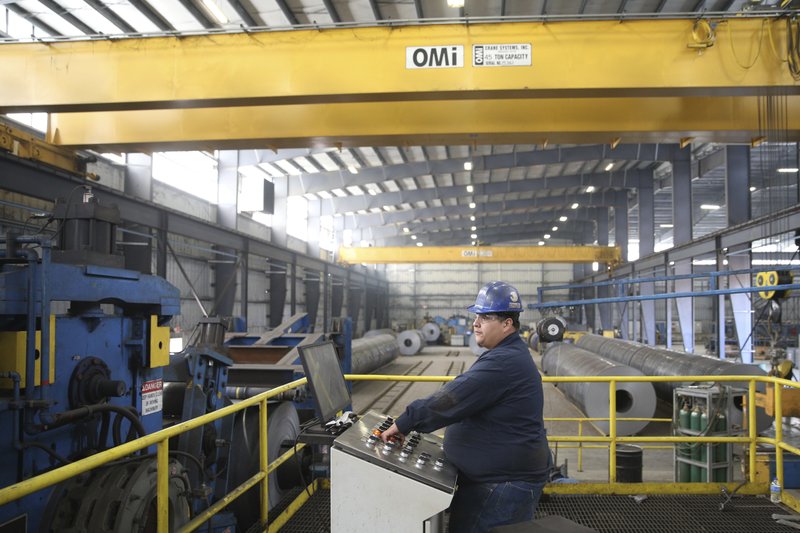
President Donald Trump’s escalating dispute with China over trade and technology is threatening jobs and profits in working-class communities where his “America First” agenda hit home. The Commerce Department has received more than 2,400 applications from companies seeking waivers from the administration’s tariffs on steel and aluminum imports, which may result in duty payments of millions of dollars for larger businesses. The department has begun posting the requests online for public comment; several of the applications released so far suggest deep misgivings with Trump’s protectionist strategy, especially in areas where he won strong support during the 2016 election. The tariffs are aimed primarily at China for flooding the global market with cheap steel and aluminum. But they’ve also led to confusion and uncertainty, according to Associated Press interviews and a review of records. In Oklahoma, Texas and Wisconsin, for example, businesses operating in the furniture, energy and food sectors have outlined the financial difficulties they’d face if they’re not excused from the steel tariff. In Okmulgee, Oklahoma, dozens of jobs hang in the balance as office furniture giant Steelcase waits to hear back from the Commerce Department. A Steelcase subsidiary, PolyVision, operates a plant in Okmulgee that uses a special type of steel from Japan to manufacture a durable glass-like surface for whiteboards and architectural purposes. PolyVision “cannot and will not be able to procure” from U.S. companies the cold-rolled steel it requires “in a sufficient and reasonably available amount or of a satisfactory quality,” Steelcase said. Trump won most of the votes cast for president in Okmulgee County. Without a waiver, Steelcase warned, the “economic viability of PolyVision (and) the small town of Okmulgee” would be jeopardized. The waiver request also indicates that a $15 million plant expansion may be at risk. Steelcase and PolyVision are on the verge of making the investment, which would create new construction and manufacturing jobs, according to the request. Roger Ballenger, Okmulgee’s city manager, said he and other local officials are “very concerned about the situation with PolyVision.” The tariffs — 25 percent on imported steel and 10 percent on imported aluminum — are designed to protect and rebuild the U.S. companies that manufacture the metals. The U.S. temporarily exempted several major trading partners, including the European Union, Mexico and Canada. China, which was left on the target list, retaliated by imposing tariffs on $3 billion in U.S. products, including apples, pork and ginseng. Trump responded by adding more protectionist measures as punishment for Chinese theft of U.S. intellectual property. And Beijing punched back by proposing tariffs on $50 billion in U.S. products including small aircraft and soybeans — a direct threat to rural areas that were key to Trump’s victory. John Hritz, CEO of JSW Steel USA in Baytown, Texas, said his company is in lockstep with Trump’s approach. “We’re in favor of growing the steel industry in this country,” Hritz said. JSW Steel, owned by Indian conglomerate JSW Group, is embarking on a $500 million overhaul of the plant that it says will create hundreds of jobs. The growth would be welcomed in Baytown, where unemployment is 9.8 percent, more than double the national rate. Baytown is located partly in Harris County, which Democrat Hillary Clinton won, and partly in Chambers County, which Trump handily won. The future is much murkier for another Baytown steel business, Borusan Mannesmann Pipe. Without a waiver, Borusan may face tariffs of $25 million to $30 million annually if it imports steel tubing and casing from its parent company in Turkey, according to information the company provided to the AP. Borusan said the Baytown production line would no longer be competitive and “jobs would be threatened” if it cannot import 135,000 metric tons of steel annually over the next two years. The pipes Borusan produces are used primarily as casing for oil and natural gas wells. But if Commerce says yes, Borusan will be able to unlock a $25 million investment in the Baytown facility as it seeks to become a “100 percent domestic supplier,” according to the waiver request. An additional $50 million expansion in pipe fabrication capacity would follow, the company said, leading to as many as 170 new jobs. Seneca Foods Corporation, the nation’s largest vegetable canner, said in its waiver application that it’s unclear, at best, if U.S. suppliers have the ability or willingness to expand their production in the long term to meet the company’s annual demand for tinplated steel. But “clearly they cannot meet demand in the short term,” Seneca told Commerce officials. That means Seneca has to buy a portion of what it needs from overseas. A person with knowledge of Seneca’s situation said the company would face a $2.25 million duty if the Commerce Department doesn’t approve its waiver request for 11,000 metric tons of tinplate it already agreed to purchase from China. The material is to be delivered this year and next, according to the waiver request. The person was not authorized to speak publicly and spoke to the AP on condition of anonymity. Seneca said it employs more than 400 people at can-making facilities in Wisconsin and Idaho and near its headquarters in New York’s Wayne County, where Trump bested Clinton. The company doesn’t warn layoffs are imminent if the waiver isn’t approved. Instead, the tariffs would likely come out of Seneca’s bottom line, the person said. Republished with the permission of the Associated Press.
Donald Trump complains about trade with China
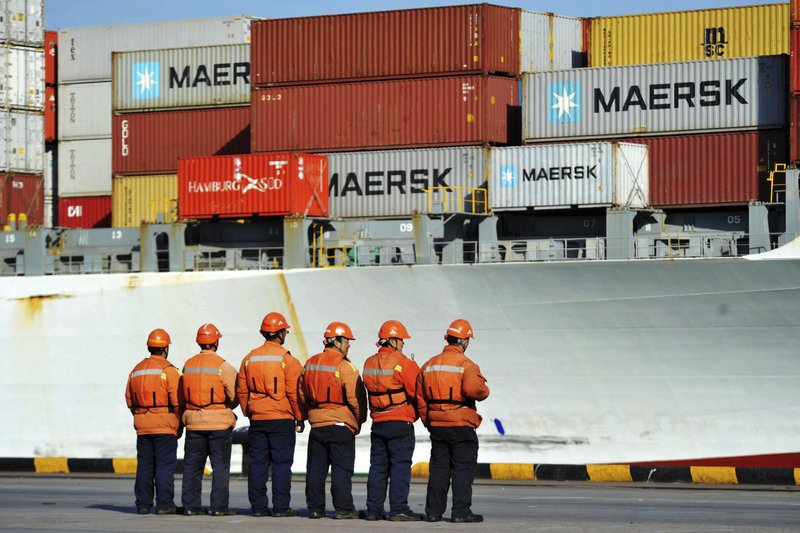
President Donald Trump on Monday complained yet again about “STUPID TRADE” with China, doing little to calm investors anxious about the escalating trade conflict between the two economic superpowers. In a tweet on Monday morning Trump said that when a Chinese-made vehicle is sent to the U.S., the tariff is only 2.5 percent, while American cars exported to China are slapped with a 25 percent tariff. Trump asked, “Does that sound like free or fair trade.” Then answered, “No, it sounds like STUPID TRADE.” China charges total duties of 25 percent on most imported cars — a 10 percent customs tariff plus a 15 percent auto tax. Since December 2016, Beijing also has charged an additional 10 percent on “super-luxury” vehicles priced above 1.3 million yuan ($200,000). Trump’s top economic advisers have offered mixed messages as to the best approach with China. Beijing has threatened to retaliate if Washington follows through with its proposed tariffs, even as Trump emphasized his bond with Chinese President Xi Jinping. “President Xi and I will always be friends, no matter what happens with our dispute on trade,” Trump tweeted Sunday. “China will take down its Trade Barriers because it is the right thing to do. Taxes will become Reciprocal & a deal will be made on Intellectual Property. Great future for both countries!” But Trump did not explain why, amid a week of economic saber-rattling between the two countries that shook global markets, he felt confident a deal could be made. The president made fixing the trade imbalance with China a centerpiece of his presidential campaign, where he frequently used incendiary language to describe how Beijing would “rape” the U.S. economically. But even as Trump cozied up to Xi and pressed China for help with derailing North Korea’s nuclear ambitions, he has ratcheted up the economic pressure and threatened tariffs, a move opposed by many fellow Republicans. The Trump administration has said it is taking action as a crackdown on China’s theft of U.S. intellectual property. The U.S. bought more than $500 billion in goods from China last year and now is planning or considering penalties on some $150 billion of those imports. The U.S. sold about $130 billion in goods to China in 2017 and faces a potentially devastating hit to its market there if China responds in kind. China has pledged to “counterattack with great strength” if Trump decides to follow through on his latest threat to impose tariffs on an additional $100 billion in Chinese goods — after an earlier announcement that targeted $50 billion. Beijing also declared that the current rhetoric made negotiations impossible, even as the White House suggested that the tariff talk was a way to spur China to the bargaining table. The new White House economic adviser, Larry Kudlow, said Sunday that a “coalition of the willing” — including Canada, much of Europe and Australia — was being formed to pressure China and that the U.S. would demand that the World Trade Organization, an arbiter of trade disputes, be stricter on Beijing. And he said that although the U.S. hoped to avoid taking action, Trump “was not bluffing.” “This is a problem caused by China, not a problem caused by President Trump,” Kudlow said on “Fox News Sunday.” But he also downplayed the tariff threat as “part of the process,” suggesting on CNN that the impact would be “benign” and said he was hopeful that China would enter negotiations. Kudlow, who started his job a week ago after his predecessor, Gary Cohn, quit over the tariff plan, brushed aside the possibility of economic repercussions. “I don’t think there’s any trade war in sight,” Kudlow told Fox. Treasury Secretary Steve Mnuchin said on CBS’ “Face the Nation” that he didn’t expect the tariffs to have a “meaningful impact on the economy” even as he left the door open for disruption. He allowed that there “could be” a trade war but said he didn’t anticipate one. Another top White House economic adviser, Peter Navarro, took a tougher tack, declaring that China’s behavior was “a wakeup call to Americans.” “They are in competition with us over economic prosperity and national defense,” Navarro said on NBC’s “Meet the Press.” ″Every day of the week China comes into our homes, our business and our government agencies. … This country is losing its strength even as China has grown its economy.” Trump’s latest proposal intensified what was already shaping up to be the biggest trade battle in more than a half century. Trump told advisers last week that he was unhappy with China’s decision to tax $50 billion in American products, including soybeans and small aircraft, in response to a U.S. move to impose tariffs on $50 billion in Chinese goods. Rather than waiting weeks for the U.S. tariffs to be implemented, Trump backed a plan by Robert Lighthizer, his trade representative, to seek the enhanced tariffs. The rising economic tensions pose a test to what has become Trump’s frequent dual-track foreign policy strategy: to establish close personal ties with another head of state even as his administration takes a harder line. The president has long talked up his friendship with Xi, whom he has praised for consolidating power in China despite its limits on democratic reforms. Further escalation could be in the offing. The U.S. Treasury Department is working on plans to restrict Chinese technology investments in the U.S. And there is talk that the U.S. could also put limits on visas for Chinese who want to visit or study in this country. For Trump, the dispute runs the risk of blunting the economic benefits of his tax overhaul, which is at the center of congressional Republicans’ case for voters to keep them in power in the 2018 elections. China’s retaliation so far has targeted Midwest farmers, many of whom were bedrock Trump supporters. Republished with the permission of the Associated Press.
China vows ‘counterattack’ on Trump administration tariffs
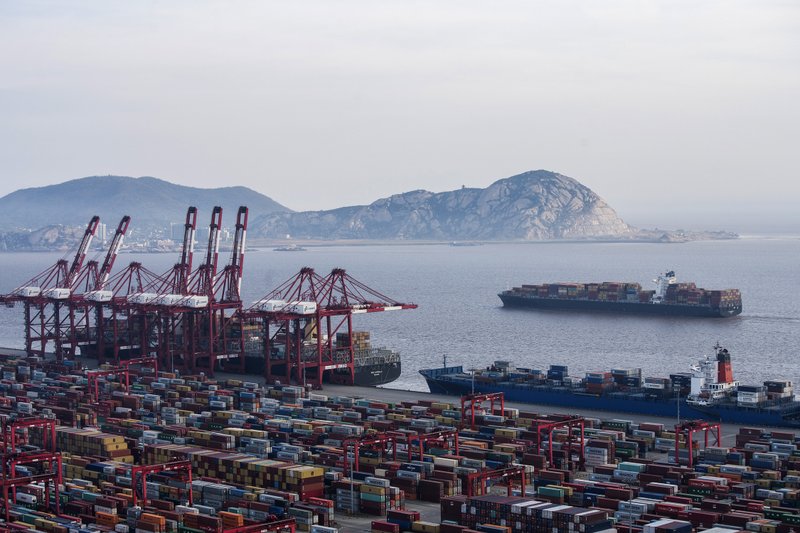
The Latest on a U.S. trade dispute with China (all times local): 9:45 a.m. China’s government says it will “counterattack with great strength” if President Donald Trump goes ahead with plans to raise U.S. tariffs on an additional $100 billion worth of Chinese goods. A Commerce Ministry spokesman said Friday that negotiations were impossible after Trump responded to Beijing’s protests about his earlier plan to raise duties on $50 billion of Chinese goods by announcing still more possible tariff hikes. The spokesman, Gao Feng, said at a news conference: “If the U.S. side announces the list of products for $100 billion in tariffs, the Chinese side has fully prepared and will without hesitation counterattack with great strength.” Gao gave no details of what measures Beijing might take. Gao said, “under these circumstances, the two sides cannot possibly conduct any negotiations about this issue.” 8:45 a.m. President Donald Trump is pleased that that aluminum prices are down after he imposed new tariffs. He tweets, “People are surprised, I’m not!” Trump tweeted Friday: “Despite the Aluminum Tariffs, Aluminum prices are DOWN 4%. People are surprised, I’m not! Lots of money coming into U.S. coffers and Jobs, Jobs, Jobs!” In March, Trump imposed tariffs on imported steel and aluminum but exempted most major countries except China and Japan. The trade dispute between the U.S. and China has escalated in recent days. Trump spoke about the clash in an interview with the “Bernie and Sid” radio show on 77 WABC Radio that was taped Thursday and aired Friday. He said there “could be a little pain.” But he added, “We’re going to have a much stronger country when we’re finished.” 1:30 a.m. China’s commerce ministry says Beijing is prepared to fight the U.S. “at any cost” as a trade dispute between the world’s two largest economies escalated with President Donald Trump ordering the U.S. trade representative to consider slapping an additional $100 billion in tariffs on Chinese goods. The ministry said in a statement Friday that if Washington persisted in what Beijing describes as protectionism, China would “dedicate itself to the end and at any cost and will definitely fight back firmly.” Trump’s surprise directive Thursday came a day after Beijing announced plans to tax $50 billion in American products, including soybeans and small aircraft, in response to a U.S. move this week to slap tariffs on $50 billion in Chinese imports. 1 a.m. President Donald Trump has instructed the U.S. trade representative to consider slapping $100 billion in additional tariffs on Chinese goods. The move comes a day after China issued a $50 billion list of U.S. goods including soybeans and small aircraft for possible tariff hikes in an escalating and potentially damaging dispute. The White House says Trump has instructed the Office of the United States Trade Representative to consider whether $100 billion of additional tariffs would be appropriate under section 301 and, if so, to identify which products they should apply to. He’s also instructed his secretary of agriculture “to implement a plan to protect our farmers and agricultural interests.” Trump argues China’s trade practices have led to the closure of American factories and the loss of millions of American jobs. Republished with the permission of the Associated Press.
China-U.S. tariffs: Mostly losers, but some winners too

China’s threat to raise tariffs on U.S. exports could be a disaster for American soybean farmers but a boon to their Brazilian and Argentine competitors, European aerospace companies and Japanese whiskey distillers. Regulators picked products China can get elsewhere when they made a $50 billion list including soybeans and small aircraft for possible retaliation in a trade spat with Washington. That should help minimize China’s losses if U.S. President Donald Trump goes ahead with a planned tariff hike and Beijing responds, said economist Lu Feng at Peking University’s School of National Development. “Compared with the U.S. list, which focuses on high-tech, China’s list is more diversified,” said Lu. “The impact to China’s overall economy is under control.” The two sides have not set a date for raising duties. Trump has approved higher duties on Chinese telecoms, aerospace and other technology goods but left time to negotiate by announcing a comment period through May 11. Beijing says its timing depends on what Trump does. Already, the threat of disruption has jolted the business world. Share prices of American exporters of aircraft, farm equipment and grain sagged Wednesday after Beijing announced its list of 106 products. Others picked for a possible 25 percent rise in Chinese import duty include beef, electric vehicles, industrial chemicals, orange juice and tobacco. Losers, including Chinese consumers who might face higher food prices, will likely outnumber winners. “It definitely will affect my choices,” said Wang Xiaoyu, a 20-year-old student in Beijing. “For daily necessities, mobile phones or electronics, I am more likely to choose domestic brands or choose products with the same price as U.S. products before the price hike.” While importers that buy big volumes of American soybeans and other goods might struggle to fill the whole gap, those shortfalls could create business opportunities for rival suppliers. “The obvious ‘winners’ would be the other major suppliers of these products,” said Adam Slater of Oxford Economics in an email. The biggest impact of higher Chinese duties would fall on American soybean farmers. China accounted for almost 60 percent of their exports and $12.4 billion in revenue for the year that ended on Aug. 31. Farmers in Brazil, Argentina or Australia might step up to supply Chinese buyers who use soybeans as animal feed and to produce cooking oil. A 25 percent price hike for American pork, whiskey and tobacco could make sources in Europe, Russia, Japan and elsewhere more attractive. It was unclear whether Beijing might try to make an exception for Chinese-owned U.S. exporters such as pork producer Smithfield Foods. WH Group, which bought Smithfield in 2013, opened a facility in the center Chinese city of Zhengzhou to produce its brands but uses meat imported from the United States. At the same time, American meat producers might save money if weaker Chinese demand depresses the price of soybeans they use to feed cows and pigs. Higher prices for American small aircraft and aviation technology also could give French and German competitors a chance to gain market share. U.S. aviation-related exports to China totaled $13.2 billion in 2016. That accounted for 58 percent of Chinese imports, giving potential rivals plenty of room to grow. “We will continue in our own efforts to proactively engage both governments,” said Boeing Co. in a statement. “A strong and vibrant aerospace industry is important to the economic prosperity and national security of both countries. Other potential winners include developing countries that might replace China as a supplier to American markets, according to William Jackson of Capital Economics. Mexico produces many of the goods targeted for U.S. tariffs on Chinese imports such as televisions and electrical circuits, he said in a report. South Korea, Malaysia and Thailand export semiconductors and other technology. “To the extent that the tariffs do result in the U.S. importing from elsewhere, other emerging markets might stand to benefit,” wrote Jackson. Republished with the permission of the Associated Press.


